HVAC Companies Woodbridge
Find top AC and Heating Services in Woodbridge
Get 3 FREE HVAC Companies quotes for your project today! Compare profiles, reviews, accreditations, portfolio, etc... and choose the best offer.
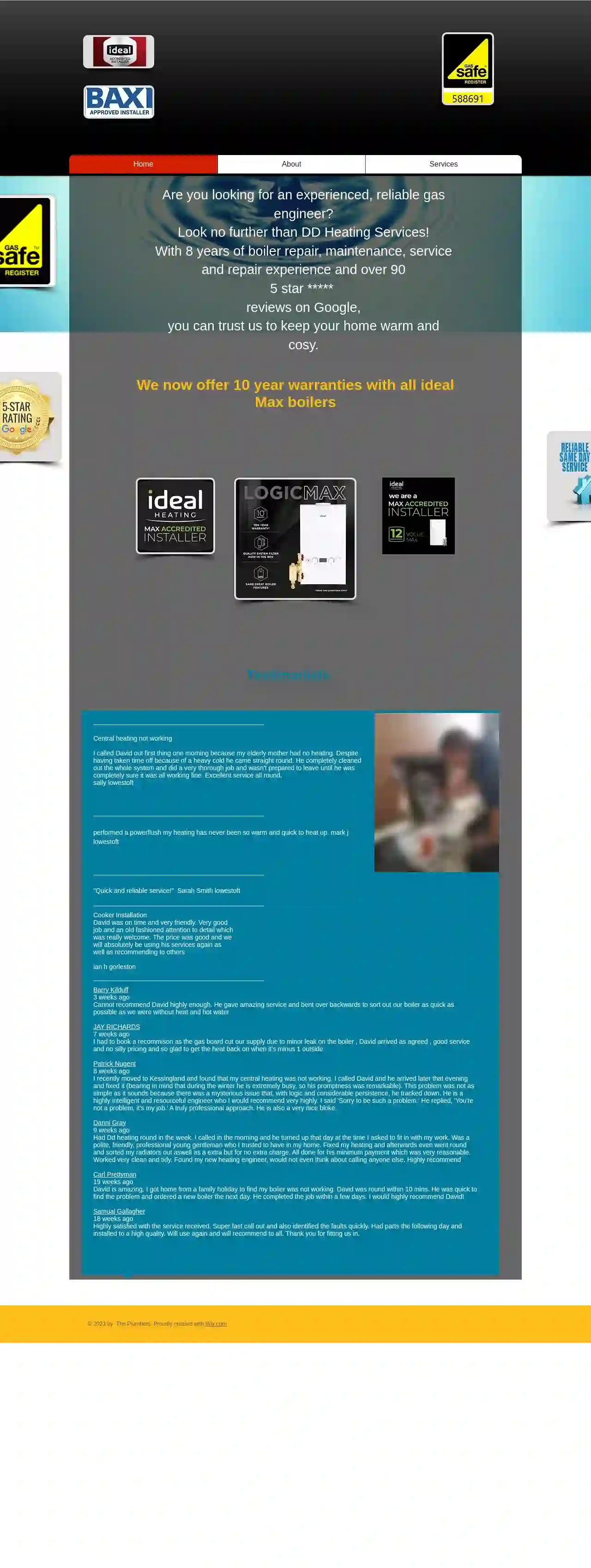
DD heating services
4.9110 reviewsLowestoft, GBDD Heating Services is a trusted name in gas engineering, boasting 8 years of experience in boiler repair, maintenance, and service. With over 90 five-star reviews on Google, we're dedicated to keeping your home warm and cosy. We pride ourselves on our reliability, expertise, and commitment to customer satisfaction. We now offer 10 year warranties with all Ideal Max boilers.
- Services
- Why Us?
- Our Team
- Testimonials
- Gallery
Get Quote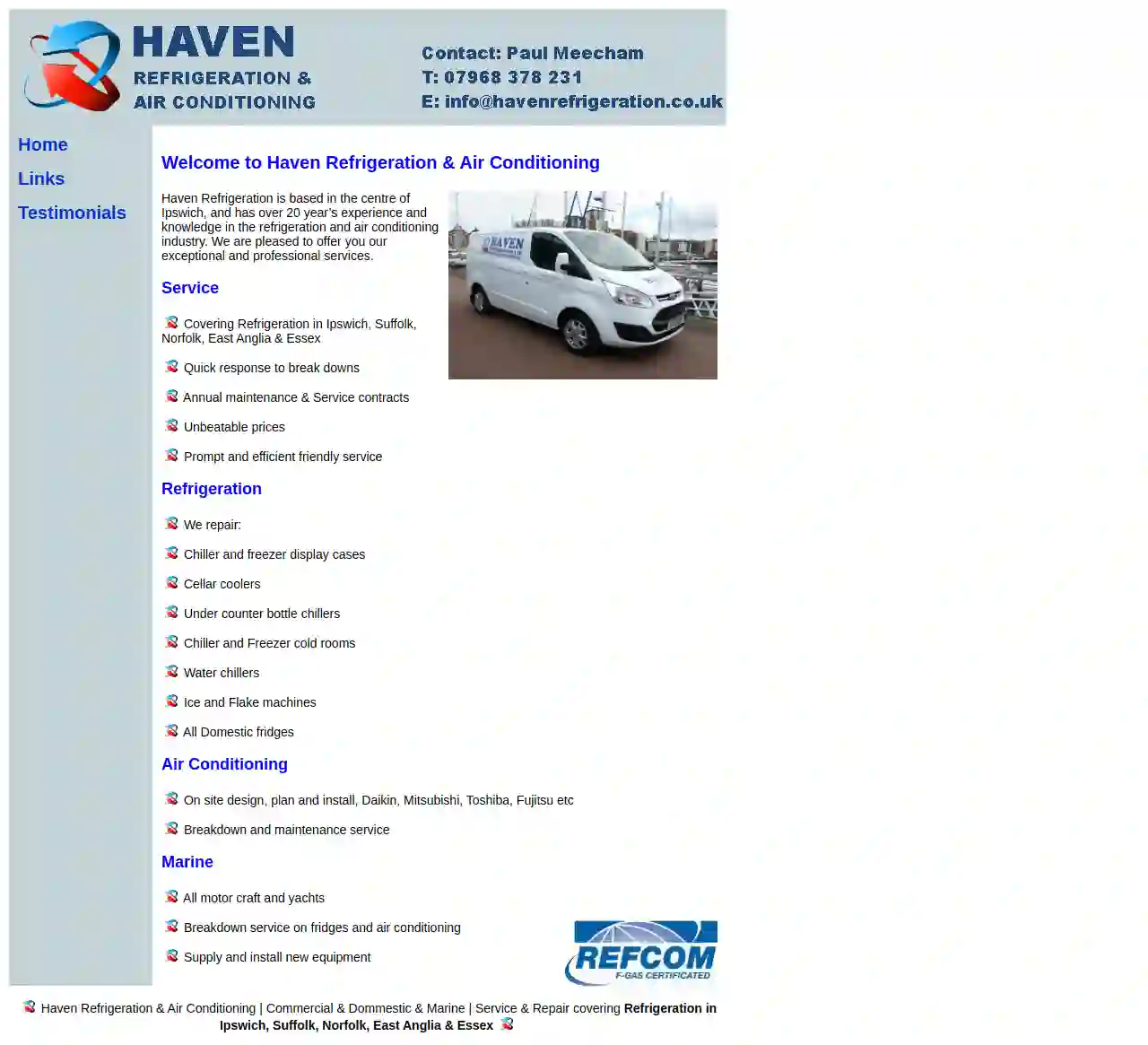
Haven Refrigeration & Air Conditioning
53 reviewsIpswich, GBWelcome to Haven Refrigeration & Air Conditioning. Haven Refrigeration is based in the centre of Ipswich, and has over 20 year’s experience and knowledge in the refrigeration and air conditioning industry. We are pleased to offer you our exceptional and professional services. Covering Refrigeration in Ipswich, Suffolk, Norfolk, East Anglia & Essex. Quick response to break downs, Annual maintenance & Service contracts, Unbeatable prices, Prompt and efficient friendly service.
- Services
- Why Us?
- Testimonials
- Gallery
Get Quote
Austin Heating and Cooling Services
52 reviewsThetford, IP24 2BL, GBWelcome to Austin Heating & Cooling Services. Based in Thetford, Norfolk, we are primarily a commercial and industrial heating and air conditioning contractor, specializing in the design, supply, installation and servicing of all types of heating and air conditioning systems. We are able to offer a complete service to our customers from the initial consultation, to the final commissioning, and following on with the planned maintenance. We can offer advice on the most suitable system for each application, to ensure that customers receive the most cost effective and energy efficient system, tailored to meet their individual requirements. We currently carry out works for numerous customers both locally and nationally. Request a site visit or quotation.
- Services
- Why Us?
- Testimonials
- Gallery
Get Quote
Hounsfield Boilers Ltd
518 reviewsLion Barn Industrial Estate, Unit 4 Maitland Road, Needham Market, IP6 8NZ, GBHounsfield Boilers Ltd is a leading manufacturer of oil boilers, providing high-quality products and exceptional customer service. With a wide range of boilers to choose from, including kitchen boilers, external boilers, and wall-mounted boilers, we have the perfect solution for your heating needs. Our boilers are designed to provide efficient and reliable heating, and we offer a 5-year warranty on all our products. We are committed to providing the best possible service to our customers, and we are proud to be a Made in Britain company.
- Services
- Why Us?
- Accreditations
- Gallery
Get Quote
Cross Air Conditioning & Ventilation Ltd
512 reviewsLakenheath Business Park, Lakenheath, Unit 1, IP27 9AA, GBCross Air Conditioning & Ventilation Ltd is a family-run business based in Lakenheath, Suffolk. We specialize in providing high-quality air conditioning and ventilation installations and maintenance for both commercial and domestic environments across East Anglia. As a trusted contractor with many years of experience in the industry, we pride ourselves on completing our work to the highest standards with minimal disruption to working and living environments. Our skilled engineers are on hand from the outset to provide all the necessary advice to help you find the perfect air conditioning solution for your needs. We are experienced and trusted contractors, and our engineers are City & Guilds trained and hold the correct F-GAS certification, enabling them to carry out works safely and legally.
- Services
- Why Us?
- Gallery
Get Quote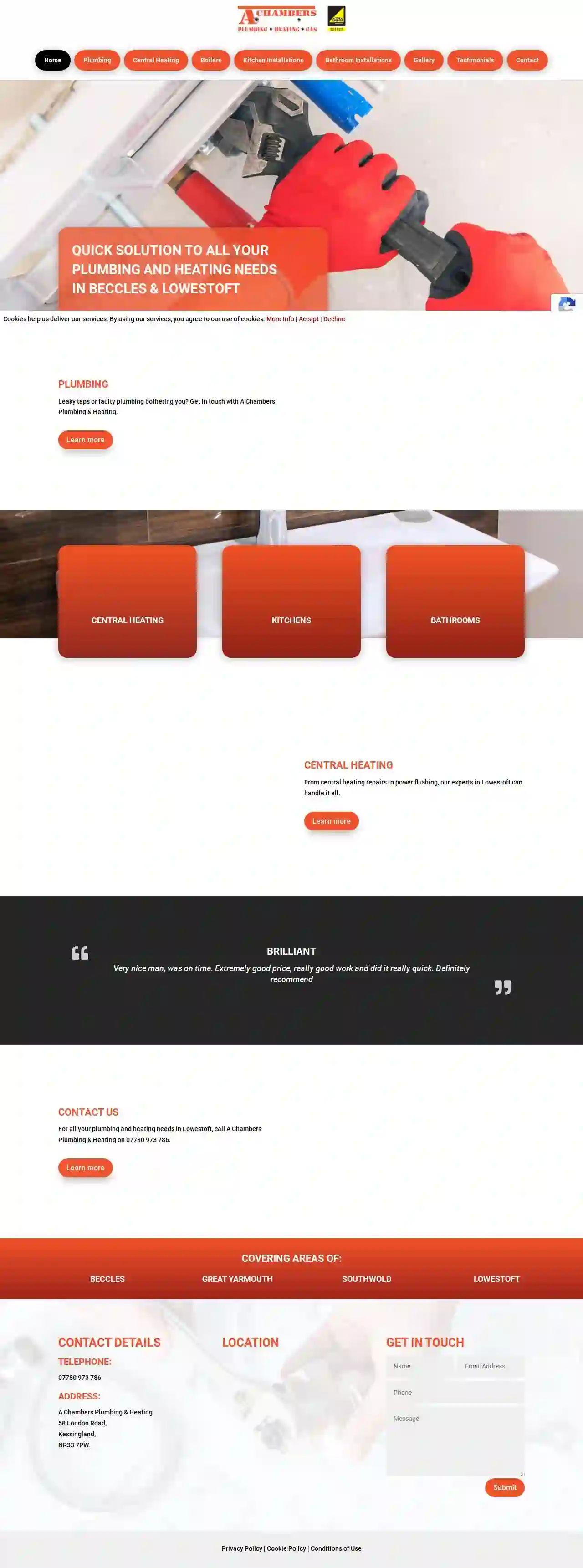
A Chambers Plumbing & Heating
57 reviews58 London Road, Kessingland, NR33 7PW, GBA Chambers Plumbing & Heating is your go-to solution for all your plumbing and heating needs in Beccles & Lowestoft. We offer a comprehensive range of services, from leaky tap repairs to central heating installations and everything in between. Our team of expert plumbers is dedicated to providing high-quality workmanship at competitive prices. We pride ourselves on our reliability, punctuality, and customer satisfaction. Whether you need a quick fix or a complete overhaul, A Chambers Plumbing & Heating is here to help.
- Services
- Why Us?
- Testimonials
- Gallery
Get Quote
H&S Heating Group Ltd
4.210 reviewsIpswich, GBOur website is undergoing a facelift! In the meantime you can contact us in the normal way: Phone: 07765712897 Email: [email protected] Follow us on instagram!
- Services
- Why Us?
- Gallery
Get Quote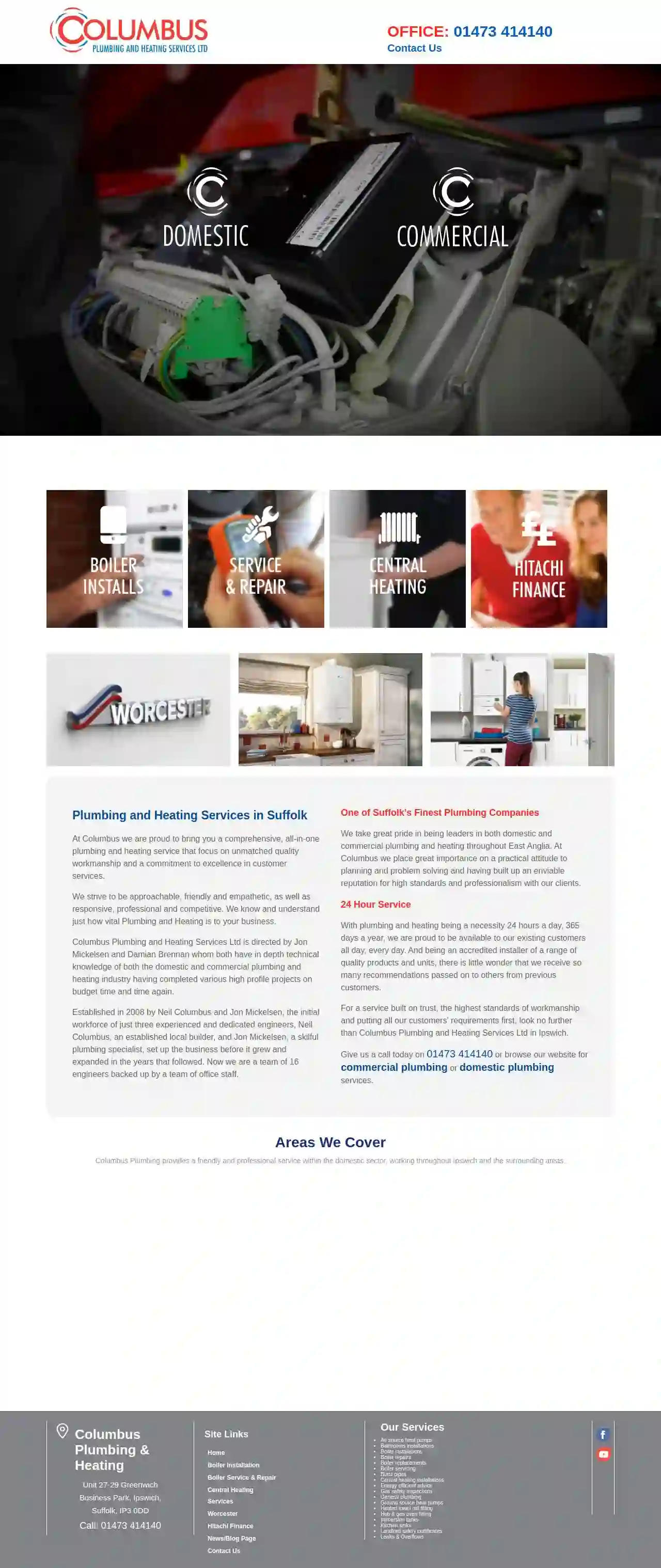
Columbus Plumbing & Heating Services Ltd
3.926 reviewsUnit 27-29 GreenwichBusiness Park, IP3 0DD, GBAt Columbus we are proud to bring you a comprehensive, all-in-one plumbing and heating service that focus on unmatched quality workmanship and a commitment to excellence in customer services. We strive to be approachable, friendly and empathetic, as well as responsive, professional and competitive. We know and understand just how vital Plumbing and Heating is to your business. Columbus Plumbing and Heating Services Ltd is directed by Jon Mickelsen and Damian Brennan whom both have in depth technical knowledge of both the domestic and commercial plumbing and heating industry having completed various high profile projects on budget time and time again. Established in 2008 by Neil Columbus and Jon Mickelsen, the initial workforce of just three experienced and dedicated engineers, Neil Columbus, an established local builder, and Jon Mickelsen, a skilful plumbing specialist, set up the business before it grew and expanded in the years that followed. Now we are a team of 16 engineers backed up by a team of office staff. One of Suffolk's Finest Plumbing Companies We take great pride in being leaders in both domestic and commercial plumbing and heating throughout East Anglia. At Columbus we place great importance on a practical attitude to planning and problem solving and having built up an enviable reputation for high standards and professionalism with our clients. 24 Hour Service With plumbing and heating being a necessity 24 hours a day, 365 days a year, we are proud to be available to our existing customers all day, every day. And being an accredited installer of a range of quality products and units, there is little wonder that we receive so many recommendations passed on to others from previous customers. For a service built on trust, the highest standards of workmanship and putting all our customers' requirements first, look no further than Columbus Plumbing and Heating Services Ltd in Ipswich. Give us a call today on 01473 414140 or browse our website for commercial plumbing or domestic plumbing services.
- Services
- Why Us?
- Our Team
- Gallery
Get Quote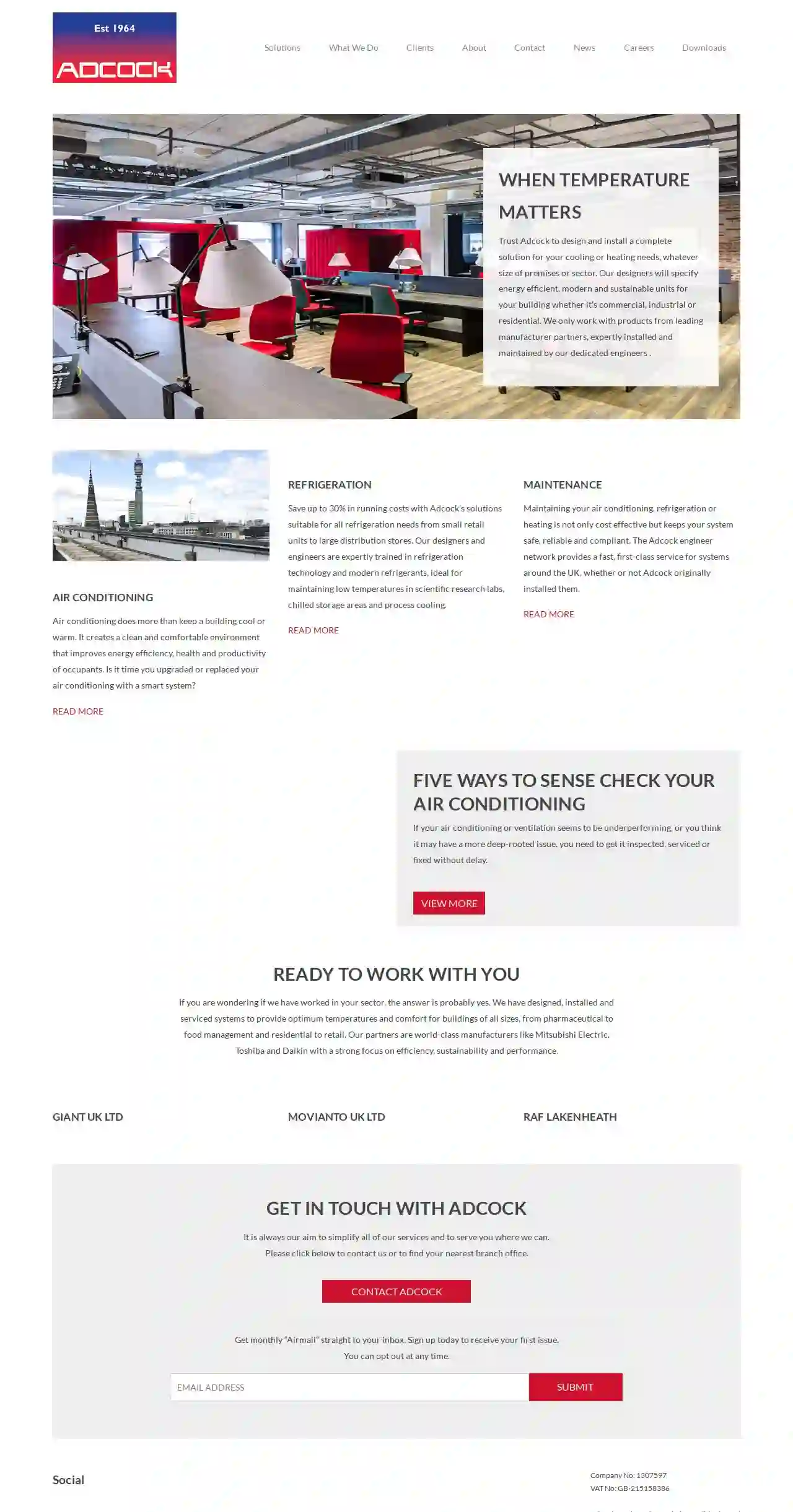
Adcock Refrigeration & Air Conditioning Ltd
52 reviewsIpswich, GBWhen Temperature Matters Trust Adcock to design and install a complete solution for your cooling or heating needs, whatever size of premises or sector. Our designers will specify energy efficient, modern and sustainable units for your building whether it’s commercial, industrial or residential. We only work with products from leading manufacturer partners, expertly installed and maintained by our dedicated engineers . Air Conditioning Air conditioning does more than keep a building cool or warm. It creates a clean and comfortable environment that improves energy efficiency, health and productivity of occupants. Is it time you upgraded or replaced your air conditioning with a smart system? Read More Refrigeration Save up to 30% in running costs with Adcock’s solutions suitable for all refrigeration needs from small retail units to large distribution stores. Our designers and engineers are expertly trained in refrigeration technology and modern refrigerants, ideal for maintaining low temperatures in scientific research labs, chilled storage areas and process cooling. Read More Maintenance Maintaining your air conditioning, refrigeration or heating is not only cost effective but keeps your system safe, reliable and compliant. The Adcock engineer network provides a fast, first-class service for systems around the UK, whether or not Adcock originally installed them. Read More Five Ways To Sense Check Your Air Conditioning If your air conditioning or ventilation seems to be underperforming, or you think it may have a more deep-rooted issue, you need to get it inspected, serviced or fixed without delay. View More Ready to work with you If you are wondering if we have worked in your sector, the answer is probably yes. We have designed, installed and serviced systems to provide optimum temperatures and comfort for buildings of all sizes, from pharmaceutical to food management and residential to retail. Our partners are world-class manufacturers like Mitsubishi Electric, Toshiba and Daikin with a strong focus on efficiency, sustainability and performance. Giant UK Ltd Movianto UK Ltd RAF Lakenheath Get In Touch With Adcock It is always our aim to simplify all of our services and to serve you where we can.Please click below to contact us or to find your nearest branch office. Contact Adcock
- Services
- Why Us?
- Gallery
Get Quote
Suffolk Sheet Metal Inc.
4.336 reviews309 Granby St, Suffolk, 23434, GBSuffolk Sheet Metal, Inc. originated some 80 years ago as a sheet metal fabrication company. The name and location are still the same but the company has changed it’s operation. In March 1970, Cola Cobb purchased the business and changed the operation to heating, air conditioning and electrical installation and service. In 1991, Cola Cobb’s son Ray joined the company. Together they provide heating and cooling equipment of various types: gas, oil, electric baseboard, air-to-air, geothermal and dual fuel equipment are some of the different systems available. In addition to heating and cooling systems, Suffolk Sheet Metal provides electrical service installations, upgrades and repair. Additional features include humidifiers, electronic air cleaners, gas fireplace logs, generators and many other services to provide efficient comfort at home and work. Suffolk Sheet Metal is a licensed Class A contractor in Virginia and North Carolina in both mechanical and electrical. Suffolk Sheet Metal is a member of the Better Business Bureau and the Qualified Gas Contractors Association. We are a drug free workplace. Suffolk Sheet Metal’s service technicians are well trained, certified personnel that are involved in continuing education programs to keep abreast of the most current industry information available. Suffolk Sheet Metal offers continuing education to all employees allowing them to be current in their area of service. For 54 years we have been serving our community and the surrounding areas not only through work at Suffolk Sheet Metal but with various non-profit organizations as well. We strive to follow the golden rule: Treat others as you would like to be treated.
- Services
- Why Us?
- Accreditations
- Our Team
- Gallery
Get Quote
Over 12,692+ HVAC Businesses on our platform
Our HVAC contractors operate in Woodbridge and beyond!
HVACCompaniesHub has curated and vetted Top HVAC Companies in and around Woodbridge. Find a top & reliable contractor today.
Frequently Asked Questions About HVAC Companies
- Regular Maintenance: Schedule annual HVAC maintenance to ensure your system is running at peak efficiency.
- Programmable Thermostat: Use a programmable or smart thermostat to optimize temperature settings based on your schedule.
- Seal Air Leaks: Caulk and weatherstrip windows and doors to prevent drafts.
- Proper Insulation: Ensure adequate insulation in your attic, walls, and floors to prevent heat loss in winter and heat gain in summer.
- Ventilation: Use fans strategically to circulate air and reduce reliance on AC.
- Energy-Efficient Appliances: Choose energy-efficient appliances to reduce your overall energy load.
- HVAC Zoning: Consider zoning your HVAC system to condition different areas of your home separately.
- Split Systems: The most common type, consisting of an outdoor unit (condenser/compressor) and an indoor unit (air handler/furnace).
- Heat Pumps: Provide both heating and cooling by transferring heat between indoor and outdoor air.
- Ductless Mini-Splits: Ideal for homes without existing ductwork or for adding heating and cooling to specific zones.
- Packaged Units: A single unit that contains all the system's components.
- Geothermal Heat Pumps: Use the earth's stable temperature to provide highly efficient heating and cooling.
How can I reduce my HVAC energy consumption?
What is an AFUE rating, and why is it important?
What are the different types of HVAC systems?
What is the best temperature to set my thermostat in summer?
How can I reduce my HVAC energy consumption?
- Regular Maintenance: Schedule annual HVAC maintenance to ensure your system is running at peak efficiency.
- Programmable Thermostat: Use a programmable or smart thermostat to optimize temperature settings based on your schedule.
- Seal Air Leaks: Caulk and weatherstrip windows and doors to prevent drafts.
- Proper Insulation: Ensure adequate insulation in your attic, walls, and floors to prevent heat loss in winter and heat gain in summer.
- Ventilation: Use fans strategically to circulate air and reduce reliance on AC.
- Energy-Efficient Appliances: Choose energy-efficient appliances to reduce your overall energy load.
- HVAC Zoning: Consider zoning your HVAC system to condition different areas of your home separately.
What is an AFUE rating, and why is it important?
What are the different types of HVAC systems?
- Split Systems: The most common type, consisting of an outdoor unit (condenser/compressor) and an indoor unit (air handler/furnace).
- Heat Pumps: Provide both heating and cooling by transferring heat between indoor and outdoor air.
- Ductless Mini-Splits: Ideal for homes without existing ductwork or for adding heating and cooling to specific zones.
- Packaged Units: A single unit that contains all the system's components.
- Geothermal Heat Pumps: Use the earth's stable temperature to provide highly efficient heating and cooling.